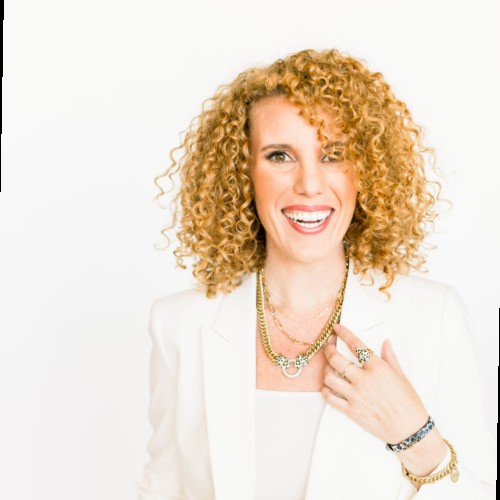Do These 3 Small Things to Find Meaning and Purpose in Your Career
Success is an intoxicating driver. It tells us from the time we're really young, that if we have more achievements and more money, and more status in society, then we'll be happy. And somewhere we all started actually believing that.
So the chase became real, to acquire more, to do more, to have more, whether that's well, job titles, followers, or influence, it's been served up as some sort of antidote to life's biggest questions.
If I could promise you a workday that felt so fulfilled and you could feel as if what you do has meaning and purpose would you be willing to take a decrease in your pay in order to have that? Yes, maybe, no. Well, if you answered yes you wouldn't be alone. Nine out of 10 people are willing to be paid less in order to do something more meaningful. That doesn't mean that's what you need to do to be happy, but it does give you a sense of how important this change is to your life and what actually matters to you.
What does it look like to pursue a life of meaning and purpose? You probably hear this next advice a lot: follow your passions, pursue your purpose, which I think has great intention but it's a lot easier said than actually done.
You're a hardworking, enterprising, wise individual. I bet if it were as easy as deciding your passion or purpose, you'd be doing it already. And maybe not taking your precious time to read this post? Luckily, you're in the right place.
In my course, How to Create a Life of Meaning and Purpose, we go through a science-backed action plan for finding purpose and meaning in life. And trust me, it doesn't always mean making big, drastic changes. What you'll find out is that it's actually all about the little things.
In this post, I'll cover 3 little things you can do right now to start working toward finding more meaning in your day every day. Watch the full course to map out the steps to take to create a life of meaning and purpose.
1. Figure out what the highest expression of yourself looks like.
While "be you" sounds like a cheery poster in a kid's classroom, it's actually imperative that you figure out what that means for you.
Because so often we're trying to fit the mold of what we think we should be. But consider molds for a moment. They're cold, hard limits that make us less of who we really are, and the easiest way to get lost is by blending in. If you're not actively coming back to yourself to who you really are and all of your desires and beliefs, personality quirks, and dreams, and traits, the right opportunities that align with your purpose can't find you.
Believe it or not, this correlation between living authentically correlates to greater life satisfaction. In a study conducted by Yona Kifer and colleagues at Tel Aviv University, two groups were assigned to remember and write about situations, one where they were authentic, and the other group recalled and wrote about a situation that they were inauthentic. Then, immediately after each person completed a test to measure their present happiness.
The group that recalled a time that they were feeling authentic, they rated feeling happier. So if we feel that way when we're recalling a situation, imagine how it feels to actually be living all of your days that way.
To quote one of my long-time mentors Tiffany Dufu, "Purpose is simply commitment inspired by experience." To which I'd add, the more that experience is an authentic one, the more meaningful that it's going to be.
To figure out what the highest expression of yourself looks like, examine all the places that you've told yourself to change in order to succeed, then reverse that. Don't change them. And if you can magnify those things.
For example, a friend of mine was always told she's too social. So, she spent years trying to be less social, less talkative, less out and about, but what happened when she decided to just be herself? She had the courage and the support to start her own event production company, literally making money to bring people together to be social. It was an extension of who she was all along. You can do the same, if you soften into the qualities that make you the most you. Try to melt away some of the I should, or I can't, and simply follow the highest expression of who you are.
2. Cultivate a gratitude practice
To find meaning, try looking first, at what kills meaning in your life.
If you're wondering what that is, I have got your answer. Comparing and keeping up. It's hard to know what your purpose is, when you're so busy looking at other people. When you're trying to keep up with your friends and how much money people make, and the achievement of your colleagues and be real, with strangers on the internet. It's nearly impossible to feel satisfied with your own life, or to find your own answers about what matters most to you. It's a rat race of keeping up, fueled by comparison and completely void of anything that's true to you.
When we do that, we feel a rush of negative emotions. Likely the opposite of what you came here looking for, because you know how this works. You don't ever compare yourself to people who have less than you. You spend all of your time finding people with so much more, and dimming their lives as totally definitely fulfilled. It's not true.
And it doesn't have to be that way. You can actually flip the comparison game, in order to bring more joy. And you do that through what writer Scott Will calls the idea of deliberate comparison.
You use this as a tool instead of trying to keep up. So within his framework, instead of using comparison to focus on what we don't have, like those networking contacts, that workout membership and time to watch that show, everyone's talking about. Use it to savor what we do have, a budding career, motivation to get healthy, and an internet connection at all. Instead of comparison, fueling your keeping up guilt, use it to fuel gratitude.
We know that gratitude is one of the surest ways to feel more joy. According to Harvard Health in positive psychology research, gratitude is strongly and consistently associated with greater happiness. So if we can trade comparing our life and instead find gratitude for it, in whatever state our life is in at this moment, we can improve our lives, not worsen them. It's hard to find your purpose.
Start this gratitude practice by writing down two things, just two, that you're grateful for right now. Do that again tomorrow and the next day too. And if you keep up this practice daily, fulfillment with what you have will come.
3. Enlist your personal champions for help.
Have you ever heard the saying, joy is an inside job? It's so true and it's also not the entire truth. Meaning and purpose are very similar. They often come from within, as we've discussed, but they can also be helped by enrolling the connections that are closest to us.
The champions in our lives can actually be incredible mirrors. They can help us determine our purpose and show us where to look to find activities and interests that will give us meaning. However, you'll never find your solutions unless you hand over your problems.
So, it's time to actually talk about what you're feeling with the people who are closest to you. Here's what happens when you come out of your shell or from behind that giant 20 foot wall to actually acknowledge what you're feeling. When you talk about it with social connections and champions that you trust, you'll feel seen, you'll feel less alone, and you'll have an opportunity for feedback.
I experienced this at one point in my career when I didn't know what actually mattered to me and I had no idea how to move forward. I felt very lost to say the least. So, inspired by a survey that I had seen one of my mentors publish as it related to a business brand, I decided to modify and create a survey to send to people about my own life. The answers were riveting, and if I'm being totally honest, everything they wrote in that survey, years and years ago, is the life I'm living today. It helped me see my own self, to see what lights me up, and where I should be spending my time, and what qualities I could lean into for my own work.
It was a 20 minute effort that totally catapulted me. And the best part, you can do it too.
You're already sending countless emails a day. What's one more? Send a note to the connections in your life that you think really see you. Let's not send this to any of the people that are not actually in your corner. You don't want to send this to the haters.
I want you to ask these people where do you see me in five years? What qualities about me stand out to you? Any situations or projects where you've seen me really light up? And if you're brave, you can ask them, what's holding me back? I think the answers will surprise you in a really good way.
If you're feeling really on it, you can make a quick survey on Google or Typeform so all the answers are right in one place. When you have everyone's feedback, look for the common themes. What they're going to do is they're going to give you some insights into your own blind spots. Remember, if your purpose comes from you and only you, then it's probably high time you get to know yourself even better. Interestingly, other people's feedback is exactly what can help you do that.
Get more tips on How to Create a Life of Meaning and Purpose in the full course.
Other courses you may be interested in:
- Complete Confidence in Minutes with Selena Rezvani
- How to Support Colleagues from Underrepresented Groups with Maxi McCoy
- How to Develop Friendships and Connect Meaningfully with Work Colleagues with Selena Rezvani
Topics: Career success tips
Related articles



